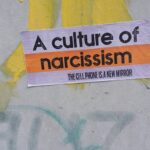ESCAPING THE NARCISSIST
Are you trapped in a toxic relationship? It's time to reclaim your life and find healing. ESCAPING THE NARCISSIST: HOW TO HEAL AND RECOVER FROM NARCISSISTIC ABUSE IN RELATIONSHIPS is your guide to breaking free and starting your journey towards recovery.
Don't let the pain control you any longer. Take the first step today and discover the strategies to overcome emotional abuse and rebuild your life. You deserve happiness and peace.
Start Your Healing Journey TodayNarcissism is a personality trait characterized by a grandiose sense of self-importance, a constant need for admiration, and a lack of empathy for others. Individuals with narcissistic traits often exhibit excessive self-focus and a sense of entitlement. This psychological profile can have a significant impact on their spending habits. Research has shown that narcissists are more likely to engage in impulsive and extravagant spending, as they seek to maintain their self-image and boost their self-esteem through material possessions. Their spending habits are often driven by a desire to impress others and gain admiration, rather than practical or rational considerations.
Narcissists may also use spending as a way to assert their superiority and dominance over others. They may seek out luxury items and expensive experiences in order to demonstrate their wealth and status. Additionally, narcissists may be more prone to taking financial risks and making impulsive purchases, as they are less concerned with the long-term consequences of their actions. This combination of grandiosity, entitlement, and impulsivity can lead to significant financial problems for individuals with narcissistic traits.
The Link Between Narcissism and Materialism
Materialism is the belief that material possessions and wealth are the key to happiness and success. It is closely linked to narcissism, as individuals with narcissistic traits often place a high value on external validation and the pursuit of status symbols. Research has shown that narcissists are more likely to prioritize material possessions and wealth, as they believe that these things will enhance their self-worth and social standing. This can lead to a preoccupation with acquiring luxury items, expensive experiences, and other status symbols.
Furthermore, materialism can exacerbate the negative effects of narcissistic traits on spending habits. The pursuit of material possessions can become a way for narcissists to constantly seek validation and admiration from others. This can lead to a cycle of excessive spending in order to maintain their self-image and social status. Additionally, materialism can contribute to a sense of entitlement and a lack of empathy for others, as narcissists may prioritize their own desires for material possessions over the needs of others.
The Impulsive and Grandiose Nature of Narcissistic Spending
Narcissistic spending is often characterized by impulsivity and grandiosity. Individuals with narcissistic traits may make impulsive purchases without considering the long-term consequences or financial implications. They may also engage in extravagant spending in order to maintain their self-image and assert their superiority over others. This can lead to a pattern of reckless financial behavior, as narcissists prioritize their own desires for immediate gratification over responsible financial planning.
Furthermore, narcissistic spending may be driven by a need for external validation and admiration. Narcissists may seek out luxury items and expensive experiences in order to gain approval and attention from others. This can lead to a cycle of excessive spending in order to maintain their self-esteem and social standing. Additionally, the grandiose nature of narcissistic spending can lead to a sense of entitlement and a lack of empathy for others, as individuals with narcissistic traits prioritize their own desires over the needs of others.
How Narcissists Use Money to Boost Their Self-Esteem
For individuals with narcissistic traits, money can be used as a tool to boost their self-esteem and maintain their self-image. Research has shown that narcissists often use material possessions and wealth as a way to gain admiration and validation from others. They may seek out luxury items and expensive experiences in order to demonstrate their social status and assert their superiority over others. Additionally, narcissists may use money as a way to compensate for feelings of inadequacy or insecurity, as they believe that material possessions will enhance their self-worth.
Furthermore, narcissists may use money as a way to gain control and power over others. They may engage in extravagant spending in order to assert their dominance and superiority in social situations. This can lead to a pattern of reckless financial behavior, as individuals with narcissistic traits prioritize their own desires for immediate gratification over responsible financial planning. Additionally, the pursuit of material possessions can become a way for narcissists to constantly seek validation and admiration from others, leading to a cycle of excessive spending in order to maintain their self-esteem.
The Financial Consequences of Narcissistic Spending
The impulsive and grandiose nature of narcissistic spending can have significant financial consequences for individuals with narcissistic traits. Research has shown that narcissists are more likely to engage in reckless financial behavior, such as overspending, taking on excessive debt, and making impulsive purchases. This can lead to financial instability, as individuals with narcissistic traits prioritize their own desires for immediate gratification over responsible financial planning.
Furthermore, the pursuit of material possessions and wealth can lead to a cycle of excessive spending in order to maintain their self-esteem and social standing. This can result in financial stress, as individuals with narcissistic traits may struggle to keep up with their extravagant lifestyle. Additionally, the link between narcissism and materialism can exacerbate the negative effects of narcissistic spending on financial well-being. The constant pursuit of status symbols and luxury items can lead to a preoccupation with acquiring material possessions at the expense of long-term financial security.
Strategies for Managing Narcissistic Spending
Managing narcissistic spending requires a combination of self-awareness, accountability, and responsible financial planning. Individuals with narcissistic traits can benefit from developing a greater understanding of their spending habits and the underlying motivations behind their financial behavior. This may involve seeking professional help from a therapist or counselor who specializes in treating narcissistic personality traits.
Additionally, individuals with narcissistic traits can benefit from setting clear financial goals and creating a budget that prioritizes long-term financial security over immediate gratification. This may involve seeking out the guidance of a financial advisor or planner who can help them develop a realistic financial plan that aligns with their values and priorities.
Furthermore, individuals with narcissistic traits can benefit from practicing mindfulness and self-reflection in order to become more aware of their impulsive spending habits. This may involve developing healthy coping mechanisms for managing stress and negative emotions without resorting to reckless financial behavior.
Seeking Professional Help for Narcissistic Financial Habits
For individuals struggling with narcissistic spending habits, seeking professional help is essential for addressing the underlying psychological factors driving their financial behavior. Therapists or counselors who specialize in treating narcissistic personality traits can provide individuals with the tools and support they need to develop healthier coping mechanisms for managing stress and negative emotions without resorting to reckless financial behavior.
Additionally, individuals with narcissistic traits can benefit from working with a financial advisor or planner who can help them develop a realistic financial plan that aligns with their values and priorities. This may involve setting clear financial goals, creating a budget that prioritizes long-term financial security over immediate gratification, and developing healthy spending habits.
Furthermore, individuals with narcissistic traits can benefit from joining support groups or seeking out peer support from others who have struggled with similar issues. This can provide them with a sense of community and understanding as they work towards managing their narcissistic spending habits.
In conclusion, the link between narcissism and spending habits is complex and multifaceted. Individuals with narcissistic traits often exhibit impulsive and grandiose spending behavior driven by a desire for external validation and admiration. This can lead to significant financial consequences if left unchecked. However, with self-awareness, accountability, and responsible financial planning, individuals with narcissistic traits can learn to manage their spending habits in a healthier way. Seeking professional help is essential for addressing the underlying psychological factors driving narcissistic spending habits and developing healthier coping mechanisms for managing stress and negative emotions without resorting to reckless financial behavior.


